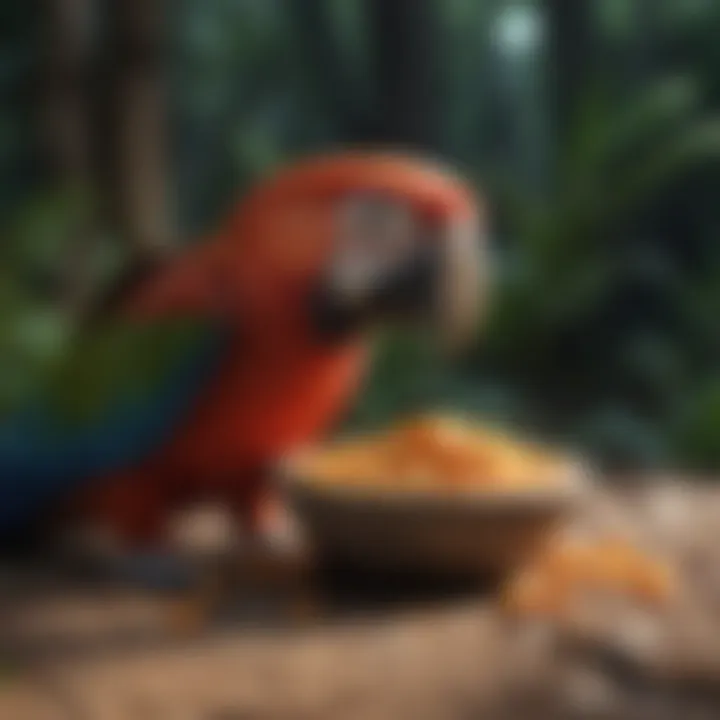Understanding the Dietary Habits of Macaws


Intro
Understanding the dietary habits of macaws is essential for any pet owner or enthusiast. These vibrant birds have specific nutritional needs that directly affect their health, behavior, and longevity. Their diet in the wild consists of a myriad of fruits, nuts, seeds, and vegetables, smartly chosen by them to meet their unique requirements. This exploration aims to demystify what macaws eat, how it aligns with their natural behaviors, and how to replicate this in a captivity setting.
Understanding Your Pet
Pet Behavior Basics
Macaws are social creatures with complex behaviors. Understanding their eating habits involves recognizing their natural instincts. In the wild, macaws utilize tools to access hard-to-reach foods, showcasing their intelligence. They often feed with others, demonstrating their social nature. These behaviors contribute to their emotional well-being, and replicating them in a domestic setting is crucial for pet owners.
Common Breed Characteristics
Each macaw species has unique characteristics that influence their diet. For instance, the Blue and Gold Macaw primarily eats fruits and seeds, while the Scarlet Macaw leans towards nuts found in their tropical habitat. Recognizing these differences helps ensure that owners meet species-specific dietary needs effectively.
Species-Specific Needs
Dietary needs vary from one species to another, often based on factors such as size and natural habitat. Larger macaws tend to require more substantial quantities of food compared to smaller species. Moreover, some macaws may have specific requirements in terms of fats and proteins. Understanding these species-specific necessities will aid owners in crafting a balanced diet tailored to their feathered friends.
Pet Care and Maintenance
Feeding Guidelines
Feeding macaws is not merely a matter of throwing seeds in a bowl. A balanced diet includes a variety of foods:
- Fresh fruits like apples, bananas, and berries
- Fresh vegetables such as carrots, spinach, and sweet potatoes
- High-quality pellets designed for macaws, which should be a staple in their diet
- Occasional treats like nuts, fats, and protein sources (in moderation)
Establishing a routine around feeding will encourage healthy eating habits.
Grooming Essentials
Grooming plays a vital role in keeping macaws healthy. Regularly checking feathers for dirt or damage is essential. Owners should also monitor the beak and claws to ensure they are not overgrown, as this could lead to complications.
Hygiene Practices
Proper hygiene is critical in maintaining a healthy ward environment. Regular cleaning of food dishes and sleeping areas prevents the growth of harmful bacteria, contributing to an overall healthier pet. Such practices also minimize the risk of diseases spreading among birds, should multiple pets be present.
Health and Wellness
Routine Vet Check-ups
Just as humans benefit from regular health check-ups, macaws too need routine visits with an avian vet. These check-ups can catch potential issues early and ensure vaccinations are up-to-date.
Vaccination Needs
Vaccination is a preventative measure. Some common vaccinations for macaws include those for Polyomavirus and Psittacosis. It’s crucial to discuss these with a veterinarian to ensure adequate protection for your pet.
Recognizing Signs of Illness
Macaws are typically robust; however, slight changes in behavior can indicate health issues. Owners should be wary of changes in eating habits, feather appearance, or energy levels. Early recognition of these signs can facilitate prompt veterinary intervention, improving outcomes.
Enrichment and Activities
Indoor vs.
Outdoor Activities
Both indoor and outdoor activities contribute to a macaw’s quality of life. Outdoor time, in a safe environment, allows for natural foraging and exploration. Indoor play should involve time outside of their cage with supervision, promoting bonding and stimulation.
Interactive Toys and Games
Providing a variety of interactive toys keeps macaws mentally stimulated. Toys designed for shredding or manipulating can help satisfy their natural inclination to explore and engage. Rotate toys regularly to keep interest levels high.
Socialization Opportunities
Social interaction is critical for a macaw’s emotional health. Regular interaction with owners and, where appropriate, other pets can enhance their confidence. This interaction builds trust and rapport, vital for any pet owner's relationship with their birds.
Understanding your macaw's dietary habits and overall care is fundamental to fostering a healthy and exciting environment for these complex birds. This knowledge will ensure that pet owners can provide the balanced nutrition and enriching experiences necessary for their well-being.
Foreword to Macaws
Macaws are a captivating species of birds known for their vibrant colors and intelligent behavior. Understanding their dietary habits is crucial for anyone considering them as pets or studying them in the wild. This section will provide insights into the unique characteristics of macaws and their nutritional needs. Knowing these aspects can help pet owners create a suitable environment for their feathered companions and ensure they thrive.
Overview of Macaws
Macaws belong to the parrot family and are indigenous to Central and South America. They are characterized by their long tails, strong beaks, and stunning plumage. Common species include the Blue-and-yellow Macaw, Scarlet Macaw, and Green-winged Macaw. These birds are social and often live in groups. They have developed various behaviors and communication skills that enhance their social interactions.
In their natural habitat, macaws occupy diverse environments, from rainforests to savannas. This adaptability is partly due to their diet, which consists of a wide range of foods. Their foraging behavior is complex, allowing them to exploit different food sources. Understanding their natural behaviors has significant implications for how they should be cared for in captivity.


Importance of Nutrition
Nutrition plays a vital role in the overall health and lifespan of macaws. A balanced diet affects not only their physical well-being but also their behavior and social interactions. Macaws require a mixture of macronutrients and micronutrients to function properly.
- Macronutrients: These include proteins, carbohydrates, and fats, which provide energy and support growth.
- Micronutrients: Vitamins and minerals are essential for immune function, feather health, and other body systems.
Providing the right nutrition is especially important for pet macaws. Captive birds often lack the variety of natural foods available in the wild. By understanding their dietary needs, owners can make informed choices about what to feed their birds, promoting longevity and preventing health issues.
Proper nutrition in macaws is not just about feeding; it's a key component of their happiness and vitality.
In summary, the importance of understanding macaws and their nutritional needs cannot be overstated. This knowledge lays the foundation for practices that can lead to healthier and happier birds.
Natural Diet of Macaws
Understanding the natural diet of macaws is vital. It provides insight into their nutritional needs and how to replicate these in captivity. By knowing what these birds eat in the wild, pet owners can foster a balanced diet that supports their health and well-being. Proper diet can greatly influence a macaw's lifespan, energy levels, and overall behavior.
Habitat and Food Sources
Macaws inhabit a variety of regions in Central and South America. They thrive in tropical rainforests, savannas, and even mangroves. Their habitat plays a crucial role in their dietary preferences. In these environments, macaws have access to a rich variety of foods.
The food sources available to them vary by location and season. Often, they forage for food high in trees. They have strong beaks, which help them crack open hard shells of nuts and seeds. The availability of fresh food sources directly impacts their health.
Types of Foods Consumed
Macaws are omnivorous birds. They consume a variety of foods to meet their nutritional requirements. This diversity helps them avoid deficiencies. Below are key categories of foods that make up their natural diet:
Fruits
Fruits are a significant part of a macaw's diet. They are rich in vitamins and fluids. Macaws enjoy eating bananas, mangoes, and papayas. These fruits are sweet and easy to digest. They provide essential sugars that offer energy.
Also, fruits contain antioxidants. This helps boost their immune system. However, too much fruit can lead to obesity. Pet owners should serve fruits moderately.
Nuts
Nuts are another important component. Macaws consume nuts such as almonds, walnuts, and Brazil nuts. Nuts are high in fats, which are beneficial for energy. The high caloric content supports their active lifestyle.
The texture of nuts is also appealing to macaws. They enjoy cracking and extracting the oily kernels. However, due to high fat content, giving nuts in moderation is crucial to avoid weight gain.
Seeds
Seeds form a part of their diet too. Macaws commonly eat sunflower seeds and pumpkin seeds. These are good sources of protein and energy. Seeds are handy because they are widely available.
Although seeds are nutritious, a diet relying heavily on them can lead to imbalances. Pet owners should limit seed portions.
Vegetables
Vegetables are crucial for a balanced diet. Macaws benefit from eating dark leafy greens, carrots, and bell peppers. Vegetables provide essential vitamins and minerals.
Additionally, they add variety in taste and texture. However, not all vegetables are suitable for macaws. Avoid giving starchy vegetables like potatoes. This helps maintain healthy digestion.
Flowers
Flowers may seem unusual, yet they are part of a macaw's diet in their natural habitat. They consume hibiscus and other edible blossoms. Flowers provide nutrients and can be a delightful treat.
Using flowers also offers enrichment. It stimulates their natural foraging instincts. However, ensure that flowers are free from pesticides to avoid health issues.
Understanding the natural diet of macaws allows pet owners to create a more enriching environment for their birds. Providing a variety of foods can support health and prevent dietary problems.
Nutritional Requirements of Macaws
Understanding the nutritional requirements of macaws is crucial for their health and well-being. Proper nutrition not only supports the physical growth of these birds but also enhances their vitality, longevity, and overall quality of life. This section will delve into the essential categories of nutrients that macaws require to thrive in both wild and captive environments. By recognizing these needs, pet owners can provide a balanced diet that mirrors the natural feeding habits of macaws, ensuring they receive the vital elements for a healthy existence.
Macronutrients
Proteins
Proteins are fundamental for the overall health of macaws. They are the building blocks of cells and play a significant role in growth and repair. Macaws require adequate protein intake to maintain muscle mass and support various bodily functions. The key characteristic of proteins is their amino acid composition. Different sources of protein provide varying types and amounts of amino acids, making it important to ensure a diverse intake.
A beneficial choice for dietary protein includes animal-based sources like cooked eggs and certain insects, alongside plant-based options such as legumes and some nuts. A unique feature of protein is its role in hormone and enzyme production. The primary advantage of incorporating sufficient protein into a macaw's diet is the support it provides for growth and healthy feather development. Neglecting protein needs may result in poor feather quality and decreased vitality.
Carbohydrates
Carbohydrates serve as the primary energy source for macaws. They are essential for maintaining energy levels and supporting daily activities. This group of nutrients is characterized by being a quick energy source. Whole grains, fruits, and vegetables are excellent choices to provide natural carbohydrates for macaws. These foods also offer additional benefits such as fiber, which aids digestion.
The unique feature of carbohydrates is their ability to provide energy without excessive calorie intake. They should be included in moderation, as too many carbohydrates can lead to obesity. Balancing the intake of complex carbohydrates, rather than simple sugars, will help maintain energy levels while promoting overall health in macaws.
Fats
Fats are another important macronutrient necessary for macaw health. They provide a concentrated energy source and are vital for the absorption of various vitamins. The key characteristic of fats is their high energy density, making them essential, but they should be offered in controlled amounts. Avocado, while it is high in fat, should be avoided due to its toxicity to birds. Instead, healthy sources of fat include seeds and nuts, which are favored by macaws.


The unique feature of fats in avian diets lies in their role in maintaining healthy skin and feathers. A balanced intake can lead to a shiny plumage and overall better conditioning. However, excessive fat consumption can lead to weight gain and other health issues, hence moderation is key.
Micronutrients
Vitamins
Vitamins play a crucial role in a macaw's diet. They are essential for various biochemical processes, including metabolism, immune function, and bone health. The key characteristic of vitamins is their function in promoting overall health. A balanced diet rich in fresh fruits and vegetables provides the necessary vitamins for macaws.
Vitamin A, for example, is vital for vision and skin health, while vitamins C and E act as antioxidants. A unique feature of vitamins is their requirement in small quantities, yet their impact on health is profound. Neglecting vitamin requirements can lead to severe health problems, underscoring the need for a diet that ensures adequate vitamin intake.
Minerals
Minerals are the building blocks of life for macaws, contributing to bone structure, nerve function, and enzyme activities. Sodium, calcium, and phosphorous are some essential minerals required in their diet. The key characteristic of minerals is that they support essential bodily functions. A diverse diet with fresh produce, seeds, and nuts typically provides the necessary minerals.
One unique feature of minerals is their role in preventing health issues such as hypocalcemia. A balanced intake can help maintain strong bones and overall health. However, excessive minerals can lead to toxicity, making it important to strike a balance. In summary, an understanding of both macronutrients and micronutrients is fundamental for fostering optimal health in macaws.
Feeding Macaws in Captivity
Feeding macaws in captivity is crucial for their overall health and wellness. In the wild, macaws have diverse diets that provide essential nutrients, but in captivity, it is often up to the caretakers to replicate that dietary variety. The right diet can significantly affect a macaw's energy levels, feathers, and their overall longevity.
Commercial Diets vs.
Home-Made Diets
When considering food options for pet macaws, both commercial and home-made diets have their pros and cons. Commercial diets are designed to meet the nutritional needs of macaws, often including a mix of pellets, seeds, and dehydrated fruit and vegetables. These products are convenient and can be easier for pet owners to manage. Nonetheless, they can sometimes lack fresh ingredients.
On the other hand, home-made diets offer more control over what a macaw consumes. Owners can select high-quality fresh foods, ensuring a diversity of nutrients. This can include fruits, vegetables, and nuts that mirror their natural diet. However, it requires knowledge to create a balanced meal, keeping macaws' unique needs in mind. It is essential to consult with a veterinarian before making any significant dietary changes to ensure the meals are complete and nutritious.
Balanced Diet for Pet Macaws
A balanced diet for pet macaws must consider their specific nutritional needs, which include macronutrients and micronutrients. Each macaw species may have slight variations in dietary requirements, but generally, an adequate diet includes:
- Pellets: Provide stability and should make up a substantial part of the diet.
- Fruits: Offer vitamins and hydration; suitable choices include apples, bananas, and mangos.
- Vegetables: Important for minerals and fiber. Leafy greens are highly recommended.
- Nuts: A good source of fats, but should be fed in moderation to prevent obesity.
The goal is to create a mix that meets their needs and helps prevent nutritional deficiencies. Additionally, it is essential to avoid offering foods that are toxic to macaws, such as avocado and chocolate.
Incorporating Variety
Just like humans, macaws thrive on variety in their diet. Providing different types of foods can stimulate their interest and encourage natural foraging behavior. This engagement is crucial for their mental well-being.
To incorporate variety:
- Rotate Food Types: Regularly change the fruits and vegetables offered to keep meals interesting.
- Use Different Preparation Methods: Sometimes serve fruits whole, and other times chop them for a new experience.
- Introduce New Items Gradually: Adding new foods in small amounts helps macaws adapt without overwhelming them.
Remember that variety should not compromise nutritional balance; every new food should still align with their dietary needs. Keeping both their physical and mental health in mind is vital for their well-being in captivity.
Key Takeaway: A comprehensive approach to feeding captive macaws includes understanding their nutritional needs, exploring options for both commercial and home-made diets, and ensuring a balanced and varied menu to promote overall health.
Common Dietary Mistakes
Understanding common dietary mistakes is crucial for pet owners aiming to keep macaws healthy. These birds require a balanced diet to thrive, and neglecting their nutritional needs can lead to various health problems. By recognizing and correcting these mistakes, caretakers can enhance the well-being of their feathered companions.
Over-reliance on Seeds
Seeds are often viewed as a staple for feeding macaws. However, an over-reliance on seeds in their diet can lead to nutritional imbalances. Seeds are high in fat and low in essential vitamins and minerals. This may result in obesity and other serious health conditions.
A well-rounded diet should include a variety of food sources. While seeds can be a part of the diet, they should not be the sole component. Instead, include fruits, vegetables, and nuts. This diversity ensures that macaws receive the necessary nutrients for their health.
Neglecting Fresh Foods
Fresh foods are vital for the health of macaws. Relying solely on dried or packaged foods can deprive them of vital nutrients. Fresh fruits and vegetables offer hydration, vitamins, and minerals essential for proper bodily functions.
Research indicates that macaws thrive on a diet rich in fresh produce. Including items such as apples, carrots, and leafy greens can dramatically improve their health. Offering a variety of fresh foods promotes not only physical health but also behavioral enrichment, as birds enjoy the different textures and flavors.
Ignoring Nutritional Needs
Ignoring the specific nutritional needs of macaws is a serious mistake. Each species of macaw may have different requirements based on their size and lifestyle. It is vital to understand these needs and tailor the diet accordingly.
Pet owners often overlook the importance of vitamins and minerals. This can lead to deficiencies, impacting feathers, beak, and overall health. Incorporating a balanced supplement can help meet these requirements. Additionally, regular consultation with a veterinarian can guide adjustments to the diet based on the bird's health status.
Recognizing and addressing dietary mistakes can significantly improve a macaw's life expectancy and quality. A thoughtful approach to their diet is essential.
Behavioral Considerations
Understanding the behavioral considerations of macaws is crucial for ensuring their dietary habits align with their natural tendencies. For pet owners, recognizing how behavior impacts feeding can enhance the overall health and well-being of these birds. Macaws are complex creatures, and their feeding rituals and social eating habits play a significant role in their nutritional health.
Feeding Rituals
Feeding rituals in macaws reflect a blend of instinct and learned behavior. In the wild, these birds often engage in specific routines when eating, involving both foraging and social interaction. For example, they may take turns eating or prefer to share food within their social groups. This behavior stresses the importance of not just the food quality but also the environment in which they eat.


When macaws are fed in captivity, it is vital to replicate this experience. Providing food in different ways—such as using foraging toys or scattering food around their space—can encourage natural foraging behavior. This not only stimulates their minds but also helps alleviate boredom, which can lead to health issues.
Here are some suggestions to encourage beneficial feeding rituals:
- Use foraging toys that require the bird to work for their food.
- Scatter food around their living area, mimicking natural foraging conditions.
- Share feeding time with your macaw to create a social atmosphere.
Social Eating Habits
The social dynamics of macaws greatly influence their eating habits. These birds are highly social animals that thrive in company. In the wild, they often feed in groups, which helps them bond and share knowledge about food sources. This natural tendency extends to their eating habits in captivity.
Encouraging social eating can be beneficial for pet macaws. Owners should consider arranging feeding times in a way that incorporates interaction—whether it’s having family members around or allowing other birds to join during mealtime. This not only strengthens the bonds between the bird and its owner but also replicates the atmosphere of a natural flock.
Key aspects of social eating include:
- Allowing interaction during feeding times to promote comfort.
- Providing food that can be shared among birds, encouraging cooperative behavior.
- Monitoring how your macaw interacts with others during meals to understand their social preferences.
Macaws, with their vivid personalities and social structures, benefit immensely from behavioral considerations in their feeding practices. By focusing on feeding rituals and social eating habits, pet owners can create a vivacious and healthy eating environment for their birds.
Engaging with macaws during feeding not only enriches their experience but also promotes mental stimulation and bonding.
Signs of Dietary Issues
Recognizing signs of dietary issues in macaws is crucial for maintaining their health and well-being. Pet owners must understand that even subtle changes in their behavior or physical condition can indicate potential nutritional deficiencies or imbalances.
Physical Symptoms
Physical symptoms can often serve as the first warning signs that a macaw's diet may not be meeting its needs. Observing these symptoms is essential for early diagnosis and treatment. Common physical symptoms to watch for include:
- Feather Quality: Dull or damaged feathers may indicate a lack of essential fatty acids or vitamins such as A and E.
- Weight Changes: Both weight loss and obesity can signal dietary issues. Weight loss may denote insufficient nutrition or underlying health problems, while obesity often results from over-reliance on high-fat foods.
- Digestive Problems: Symptoms like vomiting or diarrhea may suggest that a macaw is consuming inappropriate or spoiled foods.
- Dehydration Signs: Dry, flaky skin and excessive thirst may show that the bird's diet lacks moisture or adequate sources of water-rich fruits and vegetables.
Understanding physical symptoms is vital, as they can help pet owners take timely action to rectify dietary problems.
Behavioral Changes
Changes in behavior are equally significant and can point toward dietary deficiencies. Behavioral issues can manifest in various ways. Observing these changes helps in identifying potential dietary issues:
- Increased Aggression or Irritability: A sudden change in temperament might indicate discomfort or pain, which can arise from malnutrition or digestive issues.
- Lethargy: A decrease in activity levels may suggest that a macaw isn't receiving enough nutrients to sustain energy.
- Feather-Plucking: This behavior might emerge due to boredom or nutritional deficiencies, especially if new feathers are not growing properly.
- Change in Eating Habits: A sudden lack of interest in food can be a concerning sign. Macaws are often attracted to colorful and varied diets; a reluctance to eat might suggest they are unwell or unsatisfied with their food choices.
Understanding these behavioral changes allows pet owners to recognize when their macaw may be facing dietary problems and to seek professional help when necessary.
Consulting with a Veterinarian
Consulting with a veterinarian is a crucial aspect of ensuring the health of macaws and enhancing their dietary habits. These professionals possess the essential expertise to provide guidance on optimal nutrition based on individual needs. Macaws have complex dietary requirements that can vary between species, ages, and health conditions. A veterinarian helps to tailor a diet that addresses these unique needs, which can help avoid many health issues.
One significant benefit of professional guidance is the prevention of nutritional deficiencies or excesses. With a veterinarian's input, pet owners can develop a balanced diet that includes appropriate levels of proteins, vitamins, and minerals. This is vital to avoid common misunderstandings regarding macaw nutrition and to ensure a well-nourished pet.
Moreover, veterinarians can offer insights into various dietary products available in the market. They can advise on high-quality pellets, nutritional supplements, or safe natural foods that align with a macaw’s specific needs. A professional can also educate pet owners on how to adjust diets based on signs of health issues or changes in behavior.
"Veterinary advice is essential for pet owners aiming to offer the best nutrition for their macaws."
Importance of Professional Guidance
Professional guidance is vital for pet owners of macaws. Through consultations, owners can receive expert recommendations tailored to their macaw’s unique needs. This guidance can prevent missteps that might arise from relying on general information or anecdotal advice. It ensures that feeding practices are grounded in scientific understanding and veterinary insights.
Enlisting the help of a veterinarian enables pet owners to keep up with the latest research in avian nutrition. This is critical because dietary best practices may evolve as new studies emerge. Furthermore, a veterinarian can perform assessments and offer personalized advice based on the macaw's individual health status, ensuring that their dietary habits support overall well-being.
Regular Health Check-ups
Regular health check-ups are necessary for maintaining the well-being of macaws and keeping their diet in check. Frequent visits to the veterinarian can help detect potential health issues early on. These visits often include discussions about diet and its impact on health, which can lead to adjustments as needed.
Monitoring the macaw's condition during these check-ups allows for timely interventions should any dietary-related concerns arise. A veterinarian can evaluate weight, feather condition, and behavioral changes, which can all be influenced by nutrition. Regular assessments lay the groundwork for a long-term health plan and a diet that evolves with the macaw's aging process.
Overall, consultation with a veterinarian and regular health check-ups constitute essential parts of responsible pet ownership for macaws. These practices not only improve dietary habits but also contribute significantly to the longevity and quality of life for these vibrant birds.
Closure
Understanding the dietary habits of macaws is essential for their overall health and well-being. This conclusion synthesizes the critical elements discussed throughout the article. Nutrition is not merely about feeding these birds; it significantly impacts their physical and psychological health. By ensuring pet owners are well-informed, they can make better choices in providing suitable foods that meet the specific needs of their birds.
Recap of Dietary Needs
Macaws require a diverse range of foods to fulfill their dietary needs. This includes:
- Fruits: Fresh, ripe fruits provide essential vitamins and hydration.
- Vegetables: Leafy greens and other vegetables add fiber and various nutrients.
- Nuts and Seeds: These are primary energy sources but should be given in moderation to manage fat intake.
- Legumes and Grains: These can complement protein and carbohydrate needs.
A well-rounded diet helps develop strong bones, vibrant feathers, and good organ function. It's crucial to avoid an over-reliance on any single food type, particularly seeds, to prevent nutritional deficiencies.
Impact of Nutrition on Health
The role of nutrition in the health of macaws cannot be overstated. A balanced diet affects:
- Immune System: Proper nutrition strengthens the immune response, reducing susceptibility to diseases.
- Behavioral Patterns: A good diet can influence mood and activity levels, leading to more engaging behaviors.
- Longevity: Well-nourished macaws typically live longer, healthier lives.
“Nutrition is not just about eating; it’s about thriving.”
Inadequate nutrition can lead to health issues like obesity, malnutrition, and behavioral problems. Therefore, understanding and adhering to the dietary guidelines is paramount for every macaw owner. The insights provided in this article serve as a guide to cultivating a healthy dietary environment for these magnificent creatures.







